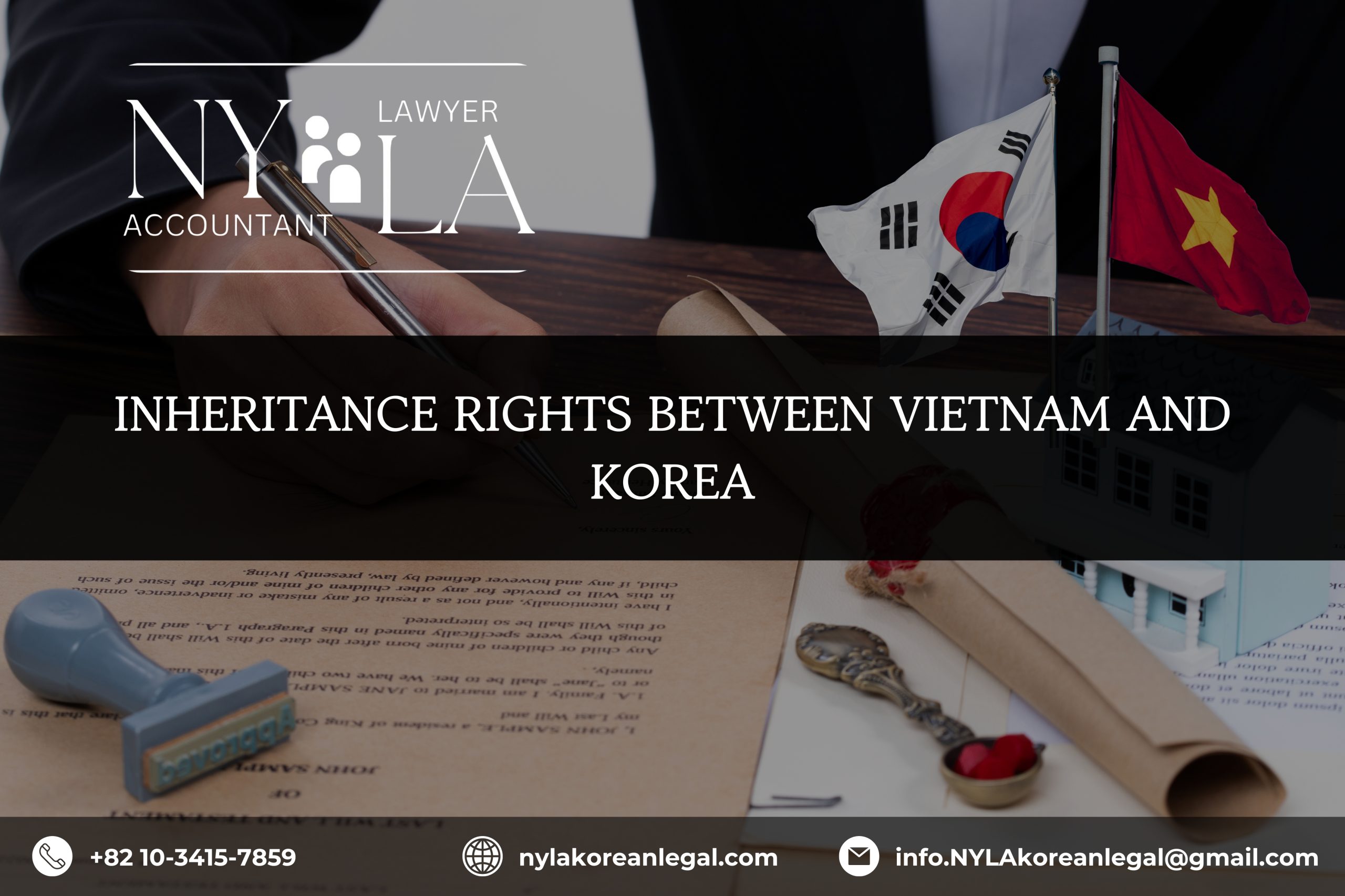In March 2025, Korea’s KBS News reported that the Korean Government is in the process of amending the inheritance tax law, introducing significantly higher tax exemptions than before. While the issue may appear to concern only Korean nationals, in practice it has considerable implications for the Vietnamese community residing in Korea, as well as for Korean nationals with families and assets in Vietnam.
Summary
1. Inheritance and inheritance tax in Korea
In Korea, inheritance is always accompanied by taxation. The recipient of the estate is required to pay tax based on the value of the inherited assets, and this type of tax has traditionally been considered rather burdensome.
– Each child is entitled to an exemption of up to 500 million won (approximately 8.7 billion VND), while a spouse is entitled to an exemption of 1 billion won (approximately 17 billion VND).
Example: If a deceased person leaves 2 billion won to a spouse and two children, the spouse would receive 1 billion won and each child 500 million won. In this case, the entire inheritance falls within the exemption thresholds, and the family would not be liable for inheritance tax.
-In addition, the Korean Government intends to introduce a fundamental change in the calculation method: instead of calculating tax based on the total estate before division, the tax will be calculated separately on each beneficiary’s share. If enacted, the new law will take effect from 2028.
On the distribution of assets:
– In the absence of a will, the surviving spouse and children shall inherit first. The spouse is generally entitled to a slightly larger share than each child.
– If a will omits a statutory heir, such heir still retains the right to claim the minimum portion, equivalent to 50% of the lawful share to which they would otherwise be entitled.
– An heir may renounce the inheritance; however, acceptance of the inheritance entails acceptance of both assets and debts.
2. Vietnamese citizens inheriting assets in Korea
Within the Vietnamese community in Korea, many women have married and established families. When a Korean spouse passes away, inheritance issues become particularly important.
– Which law applies? ===> Korean law applies. Even if the heir is a Vietnamese citizen, the distribution of assets is governed by the local law.
– Who are eligible heirs? ===> The spouse and children are given priority. In the absence of children, elderly parents may inherit.
– How is the tax? ===> Vietnamese heirs are subject to the same inheritance tax obligations as Korean citizens. If the inherited share exceeds the exemption threshold, the tax authorities will assess the payable amount.
– Are there any restrictions on benefits of foreign heirs? ==> There are no restrictions. Vietnamese citizens are entitled to their lawful inheritance shares on equal terms with Korean heirs.

3. Korean citizens inheriting property in Vietnam
Conversely, an increasing number of Korean nationals reside in Vietnam, either married to Vietnamese spouses or investing in real estate. Upon the death of a family member, the distribution of assets is governed by Vietnamese law.
– Order of succession: Spouse, children, and parents, similar to the rules in Korea.
– Entitlement to land: This is the key difference. Vietnamese law does not permit foreign nationals to hold land use rights.They are only allowed to own condominium apartments and detached houses under certain conditions provided in Article 17 of the 2023 Law on Housing. One such condition is inheriting residential property in commercial housing projects not located in areas subject to national defense or security protection. Accordingly, if this condition is not met, Korean heirs may still receive the value of the property, but they are generally required to sell or assign the property in order to receive monetary compensation.
– Taxation in Vietnam: Vietnam does not impose a separate inheritance tax; instead, inherited assets are treated as “income.” Personal income tax on inheritance is assessed under the rules applicable to the specific type of asset (e.g., real estate, securities, investment projects). The applicable tax liability for the heir will be calculated in accordance with the provisions of Vietnam’s personal income tax law.
4. When assets are located in both countries
In practice, many families are of “dual nationality,” for instance, a Korean husband, a Vietnamese wife, and children residing both in Korea and Vietnam. In such cases, assets are often located in both jurisdictions, which complicates inheritance procedures.
– Assets in Korea: Distribution and taxation are governed by Korean law.
– Assets in Vietnam: Distribution and taxation are governed by Vietnamese law.
– Procedural Requirements: Heirs are generally required to initiate proceedings in both countries. Documents such as wills, birth certificates, and death certificates must be translated, notarized, and legalized through consular authentication in order to be legally recognized.
5. Practical points to remember
– Make a will early: If assets are located in both Korea and Vietnam, a clear will should be prepared for each jurisdiction.
– Prepare documentation: Marriage certificates, birth certificates, death certificates, and wills must all be translated and duly certified.
– Understand limitations: Vietnamese heirs in Korea are subject to inheritance tax; Korean heirs in Vietnam are not permitted to hold land title.
– Remember liabilities: Inheriting does not only entail receiving assets, but may also include assuming the debts of the deceased.
6. Conclusion
In conclusion, both Vietnamese citizens residing in Korea and Korean citizens residing in Vietnam are entitled to lawful inheritance rights; however, the application of such rights differs between the two jurisdictions:
– Korea: Inheritance tax is comparatively high, though exemption thresholds are being expanded. The rights of spouses and children are clearly safeguarded.
– Vietnam: Taxation is lighter, but foreign heirs are not permitted to own land and may only receive its monetary value.
– Dual-nationality families: Early planning is advisable, particularly through wills and supporting legal documentation, in order to prevent future disputes.
7. About NYLA – Korean Legal Office

■ NYLA – Your Trusted Legal Partner in Korea
At NYLA, we understand that the success of foreign businesses in Korea requires not only a solid business strategy but also reliable legal support. With a team of experienced Korean attorneys and legal professionals, NYLA provides tailored legal services for companies, investors, and individuals operating or planning to establish a presence in Korea.
We support our clients throughout the entire business journey with comprehensive services, including:
- Legal consultation on company establishment, taxation, and immigration;
- Advice on commercial real estate, franchising, and product distribution;
- Support in human resources, marketing, and business strategy.
In addition to legal advisory, NYLA also represents clients in civil litigation cases related to business, labor, marriage, family, and inheritance to ensure their rights and interests are fully protected.
■ Contact NYLA

If you’re a foreign business or individual looking for a reliable legal partner in Korea, NYLA is here to help. We are committed to delivering effective, practical, and personalized legal solutions for every client.
With a proven track record of assisting hundreds of international clients, our team is equipped to help you navigate complex legal challenges—whether it’s commercial disputes, contract issues, or foreign investment guidance.
Don’t let legal matters hold you back. Let NYLA be your trusted guide in the Korean market.
■ Get in touch with NYLA for expert legal support
| Website: https://nylakoreanlegal.com/
FB: https://www.facebook.com/nyla.koreanlegal Tiktok: https://www.tiktok.com/@nylakoreanlegal Youtube: https://www.youtube.com/@NYLA-xd8qx Email: info.NYLAkoreanlegal@gmail.com SĐT: +82 10-3415-7859 |
 |






















































